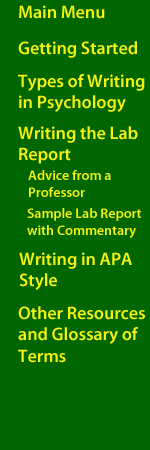

Getting Started with Writing in Psychology
By Athena Hensel
(printable version here)
Often, the goal of writing in psychology is to analyze previous studies and integrate findings from those studies into current theoretical literature. By doing so, as an author you suggest to the academic community what conclusions might be made about "how the mind works," where research should go in the future, or things the public could do to improve such fields as mental health, or education, or criminal justice. Before you even begin writing, it helps to have that idea in mind, so that when you read and prewrite you are thinking about synthesizing the information from previous studies rather than just repeating their conclusions.
The Literature Review
Because writing in this field is very direct (meaning you can't write a "fluffy" paper and get a good grade) it's very important to have an organized set of notes for the studies you read. Hjortshoj (2009) reminds us that good notes don't have to record every detail, but should give you an outline of the reading that helps you "reconstruct" the text days, weeks, or months later (p. 22-23). This is important when writing a longer research paper, because you will save yourself time looking up the source for a factoid you know you remember but can't quite put an author and date to.
A helpful method of note-taking for studies with an experimental design is to summarize or put in bullets the key points from the four main sections of the paper (Introduction, Methods, Results, Discussion). Dr. Bishop from the UR biology department has also compiled a list of questions to ask yourself when reading a scientific article, to glean the most important points out of often dense texts.
Outlining and Developing your Thesis
It's easy to get bogged down in facts and figures from previous research when writing a research paper or thesis. Constructing a basic framework for your paper helps tremendously with keeping your writing concise and directly related to your central topic.
One point to keep in mind before trying to make an outline is what the thesis of your paper is. As you probably learned in English class at some point, a thesis is the "governing claim" to a paper, which encapsulates the essential point the author is trying to impart. Within the context of psychology, your thesis should be whatever prediction or conclusion you want to make about the data you will present in your paper. This would obviously change given the type of writing you are doing. In general, your thesis is your novel contribution to the research literature.For instance, are you describing the results of a study/set of studies? Then your thesis could be your initial hypothesis about the data. This is because your hypothesis is the capstone to all of the previous studies you researched and their conclusions about whatever topic you're investigating. In our section "Lab Report Format and Style" we discuss in-depth what each section of a lab report (and therefore the standard empirical journal article) should have. Are you doing a review of the current literature on therapy techniques for a certain type of disorder? Then your thesis could be whatever main conclusion you want to put forth given your review and comparison of the different techniques.
Carson, Fama and Clancey (2008) suggest the following frameworks for constructing a thesis:
- You may provide a critique of an existing theory and offer a new theory that seems better supported by the research you review.
- You may compare and contrast two or more competing theories and provide an informed opinion about which theory is better supported by the available data.
- You may combine the data from two or more disparate topic areas to arrive at new insights about your topic.
- Or, you may point out a trend in the data that has been overlooked by others.
Pre-Writing Strategies
Below are some techniques you can use for organizing your thoughts in consctructing a coherent and concise piece of scientific writing.- Outlining: An outline is a general plan of the information you'll be presenting in your paper. The classic sentence or topic outlining procedure works very well for writing in psychology, as most research papers or lab reports will follow the standard five-section APA format. You can read a more comprehensive overview of outlining techniques here.
- Webbing/Clustering: For those of you who learn visually, making a diagram of your line of reasoning may be helpful as it presents your topics from general to specific, showing how each relates to the central thesis. Start with your overall topic or thesis in the center of your paper in a bubble. From that center bubble, list the main subtopics you plan to address encircling the main topic, branching out from it. Around each subtopic, list examples or evidence; you can add as many offshoots as you feel necessary--sometimes these webs get really large and complicated! For more information, see the Writer's Web page on clustering.
And of course-- don't be afraid to ask for help!
Other Disciplines | Writer's Web | Writing Center | Make
an Appointment | Library | Department of Psychology
Copyright Info
Hjortshoj, K. (2009). The transition to college writing. NY: Bedford/St. Martins.
Carson, S. H., Jama, J. & Clancy, K. (2008). Writing for psychology: A guide for psychology concentrators. Cambridge, MA: Harvard University Press.